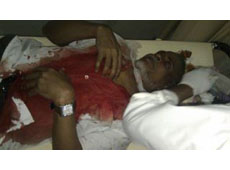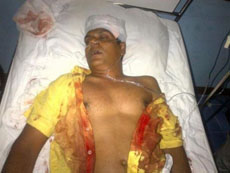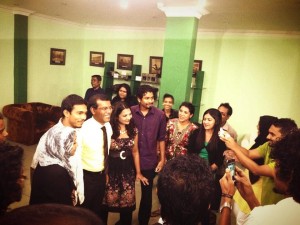The Supreme Court has taken over a case filed at the Civil Court by dismissed Human Rights Minister Dhiyana Saeed, who had requested a ruling declaring that the transfer of power on February 7, 2012 was illegitimate.
The Supreme Court ordered the lower court last week to suspend its proceedings and send over the case files before 3:00pm on Thursday (May 23). The court order (Dhivehi) stated that the apex court would determine whether the Civil Court had jurisdiction to hear the case.
The court order was issued following a request by the Attorney General’s Office (AGO) for the Supreme Court to decide on the question of jurisdiction.
At the first hearing of the Civil Court case, the AGO requested proceedings be halted pending a ruling from the Supreme Court. However, the judge decided to proceed with the hearing in the absence of a court order by the Supreme Court.
The Supreme Court order was revealed today by the recently launched official twitter account of the Civil Court.
Proceedings have been halted – Fathimath Dhiyana & Co v Speaker of Parliament[907/Cv-C/2013]under Supreme Court Order twitter.com/MVCivilCourt/s…
— MV Civil Court (@MVCivilCourt) May 26, 2013
Dhiyana Saeed – also former SAARC Secretary General and former President Mohamed Nasheed’s first Attorney General – had first submitted the case to the High Court, which however decided that it was outside the appeal court’s jurisdiction.
The case was filed at the Civil Court earlier this month.
The defendant in Dhiyana’s lawsuit was Speaker of Parliament Abdulla Shahid, who recently defected from the government-aligned Dhivehi Rayyithunge Party (DRP) to the opposition Maldivian Democratic Party (MDP) and is currently campaigning for former President Nasheed.
Nasheed resigned in the wake of a violent mutiny by Special Operations (SO) police officers, who assaulted government supporters, ransacked the ruling party Haruge (meeting hall), protested at the Republic Square, clashed with the military, vandalised the police headquarters and stormed the state broadcaster on the morning of February 7.
Saeed’s lawsuit noted that Shahid was the state official with the authority under article 121 of the constitution to declare the office of the president vacant, should an incumbent president resign or vacate the office.
“It was the Speaker of Parliament who declared the office of president vacant, be it had he done it knowingly, mistakenly or unknowingly,” Saeed told newspaper Haveeru. “This doesn’t mean Shahid committed a criminal offense. It also does not mean that he partook in the events or that he made the decision [maliciously].”
She contended that Speaker Shahid had failed to look into the circumstances surrounding Nasheed’s resignation before accepting the letter.
Saeed told Minivan News that she and her co-counsels “stopped short of asking for Nasheed’s reinstatement,” adding that she did not have “the locus standi to ask for a particular relief.”
“If the ruling comes in our favour, it might be possible for Nasheed to institute a second proceeding for reinstatement. As far as this case is concerned, our interest is in the rule of law and invoking constitutional process to uphold the legal order as stipulated by the constitution,” Saeed explained at the time.
Supreme Court intervention
Meanwhile, in her report to the United Nations Human Rights Council following a visit to the Maldives, UN Special Rapporteur on Independence of Judges and Lawyers Gabriela Knaul observed that it was “troublesome that some of the Supreme Court’s interventions are perceived as arbitrary and as serving the judges’ own personal interests.”
“Moreover, the Supreme Court is said to have taken away cases directly from the superior courts before they were adjudicated, without explaining which criteria or procedures were applied,” Knaul wrote.
The Supreme Court has on a number of occasions issued writs of mandamus taking over cases from lower courts. In November 2012, the Supreme Court instructed the High Court to suspend proceedings on an appeal by former President Nasheed concerning the legitimacy of the Hulhumale’ Magistrate Court.
At the same time, the apex court ordered the Civil Court to send over all files on a case submitted by a lawyer, Ismail Visham, disputing the legal status of the Hulhumale’ Magistrate Court.
The Supreme Court also intervened in litigation concerning a border control project awarded to Malaysian mobile security firm Nexbis.
Transfer of power
Following her dismissal from the cabinet by President Dr Mohamed Waheed last year, Saeed released a personal memoir alleging that Nasheed’s political rivals had conspired to assassinate him.
Saeed alleged that the controversial transfer of presidential power on February 7 was the result of a premeditated and well-orchestrated plan, and questioned the findings of the Commonwealth-backed Commission of National Inquiry (CoNI), which concluded that Nasheed had resigned voluntarily.
In January 2013, parliament’s Government Oversight Committee commenced a review of the CoNI report and heard testimony from six of the highest-ranking officers of the security services at the time of the transfer of power.
Following its inquiry, Committee Chair MP Ali Waheed claimed that the report produced by CoNI was “flawed” based on the findings of the committee.
The CoNI report lacked “key information [senior police and military officers] had given” while “others claimed their information was wrongly presented,” the MDP MP said at the time.







